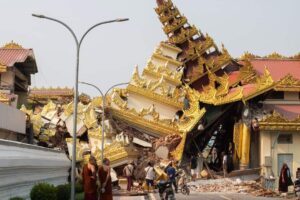Treaty with ASEAN is largely symbolic but comes as Kyiv seeks more international support and the isolation of Russia on the world stage.
Ukraine has signed a peace treaty with nations in Southeast Asia, a largely symbolic act that comes as Kyiv seeks to shore up international support and further isolate Russia on the world stage.
Ukrainian foreign minister Dmytro Kulbela signed the Treaty on Amity and Cooperation in Southeast Asia at the annual summit of the Association of Southeast Asian Nations (ASEAN) in the Cambodian capital Phnom Penh on Thursday.
The “TAC” peace treaty commits parties to “mutual respect for the independence, sovereignty, equality, territorial integrity and national identity of all nations”.
Despite the invitation to enter into a treaty with ASEAN, local media reported that the regional bloc had failed to agree on allowing Ukrainian President Volodymyr Zelenskyy to address the summit by video link from Kyiv.
Zelenskyy has addressed summits and parliaments around the world since the Russian invasion of Ukraine in February, including the UN General Assembly, the UN Security Council, the UK’s House of Commons, and the US Congress.
The 10-member ASEAN bloc has been reserved in their stance towards the Russian invasion, condemning the war but generally trying to avoid assigning blame to Moscow.
Eight of the 10 ASEAN countries voted in favour of a UNGA resolution condemning Russian aggression, with close Russian allies Vietnam and Laos abstaining from the vote. The ASEAN members are Brunei, Cambodia, Indonesia, Laos, Malaysia, Myanmar, the Philippines, Singapore, Thailand, and Vietnam.
Myanmar’s military rulers are not currently allowed to participate in ASEAN meetings due to ongoing violence perpetrated in the country since their coup in February 2021. The generals had refused to send non-political representatives to ASEAN instead.
Member state Singapore has taken the strongest stance on the war, imposing unilateral sanctions on Russia, while Cambodia’s Prime Minster Hun Sen, the current holder of the rotating ASEAN chair, has been increasingly supportive of Ukraine.
“Cambodia is against the aggression, the threat of or use of force over sovereignty and the territorial integrity of an independent state, and does not support the secession or the annexation of territory by other countries,” Hun Sen told Zelenskyy during a recent telephone call.
The Cambodian leader also pledged to support Ukraine’s aspirations to become a “Sectoral Dialogue Partner” with ASEAN, a step towards the full “Dialogue Partnership” the group has with Russia, China, the US and others.
US President Joe Biden is attending the ASEAN and the parallel East Asia Summit talks in person, while Russian President Vladimir Putin is not – with Moscow instead believed to be sending Foreign Minister Sergey Lavrov, though that is not yet confirmed.
Indonesia confirmed on Thursday that Putin will also not attend the G-20 summit in Bali next week, and it seems unlikely he will attend the Asia-Pacific Economic Cooperation summit in Bangkok that follows.
Putin’s absence should leave the door open for Ukraine to try and win more support internationally, wrote Susannah Patton, director of the Southeast Asia Program at the Australian think-tank Lowy Institute, in an analysis published Thursday.
“While opinion in Asia about Russia’s invasion of Ukraine remains mixed, the summits look likely to be better for Ukraine than Russia, and Putin’s absence will undercut talk of a Russian pivot to Asia,” Patton said.
Source : Aljazeera















